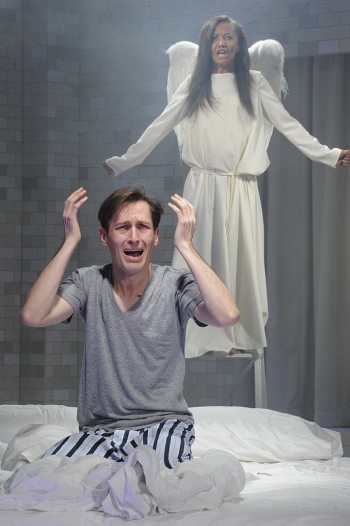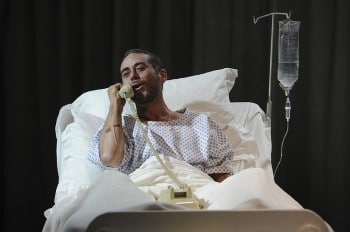Angels in America soars
It’s a rare thing for actors to be given the kind of gifts they’re given in Tony Kushner’s seven-hour epic Angels in America.

Over the course of the two sprawling parts, Millenium Approaches and Perestroika, some actors are given several vastly different characters, whereas others stick mainly to the one. It’s a work where each character is fully developed and is given the time to have a complete emotional arc. What Kushner’s writing allows an actor to do is to take the less obvious choices and become completely immersed in that character’s world.
That’s why, in this production’s constellation of fine theatrical elements, it’s the performances that shine brightest. Marcus Graham is fantastically villainous as closeted gay lawyer Roy Cohn, picking up the smallest nuances in each line. His performance is both physically imposing and vulnerable. Luke Mullins is a perfect Prior Walter, the young gay man living with AIDS at the centre of the story. Mullins delivers a finely textured performance and doesn’t miss a beat in the entire play.
Mitchell Butel is ruthless in his portrayal of Louis, bringing the unassuming self-obsession and vanity necessary to make the role work. Paula Arundell is otherworldly as the Angel and Ashley Zukerman has internal struggle down to a tee as closeted Mormon clerk Joseph.
Robyn Nevin shows versatility, going from bearded Rabbi to Ethel Rosenberg, a Jewish woman executed as an apparent Communist spy, to the no-nonsense Mormon mother Hannah. Her performance as Hannah provides some of the play’s most tender moments.
Deobia Oparei as gay nurse and former drag queen Belize and Amber McMahon as the jilted Mormon wife Harper, both take bold choices with their characters. It takes a good chunk of the first part to work out exactly what they’re doing and why, but once you get your head around those choices and begin to understand their characters, they’re two of the most rewarding performances.

Kushner’s work is marvelously messy and covers a veritable gamut of styles, moods and approaches. It’s a difficult beast to tame and director Eamon Flack has absolutely succeeded. He expertly handles the episodic nature of the piece, shifting from moment to moment at lightning pace. His work in a scene in the second act of part one, where two couples simultaneously separate, is fantastic.
Michael Hankin’s set, covered wall-to-floor in shining off-white tiles, is transformed from Brooklyn apartment to a hallucinated Antarctica with Niklas Pajanti’s stunning lighting design. Mel Page’s costumes are fantastic from the everyday through to the fantastical and sound designer Steve Francis has created a rich, varied soundscape. Working with lighting, set, costumes and sound, Flack has created a production that is full of glitter, pyrotechnics and magic.
The beauty of Kushner’s writing lies in the way that big ideas surrounding humanity, religion, race and politics resonate in the most unlikely and seemingly insignificant of characters. Flack’s lightness of touch and comedic sensibility mean that as big as Kushner’s ideas are, they always feel immediate, tender and real.
For theatre lovers, this is an absolute treat. Belvoir’s season allows audiences to either watch the two parts over two separate nights or settle in early on a Saturday or Sunday afternoon for a theatrical marathon. Doing so is like eating a massive piece of a rich, layered and expertly crafted chocolate cake. Consuming the whole thing at once is a sublime experience, even if you do feel a little woozy by the end. Belvoir’s Angels is delicious, decadent and absolutely unmissable.
